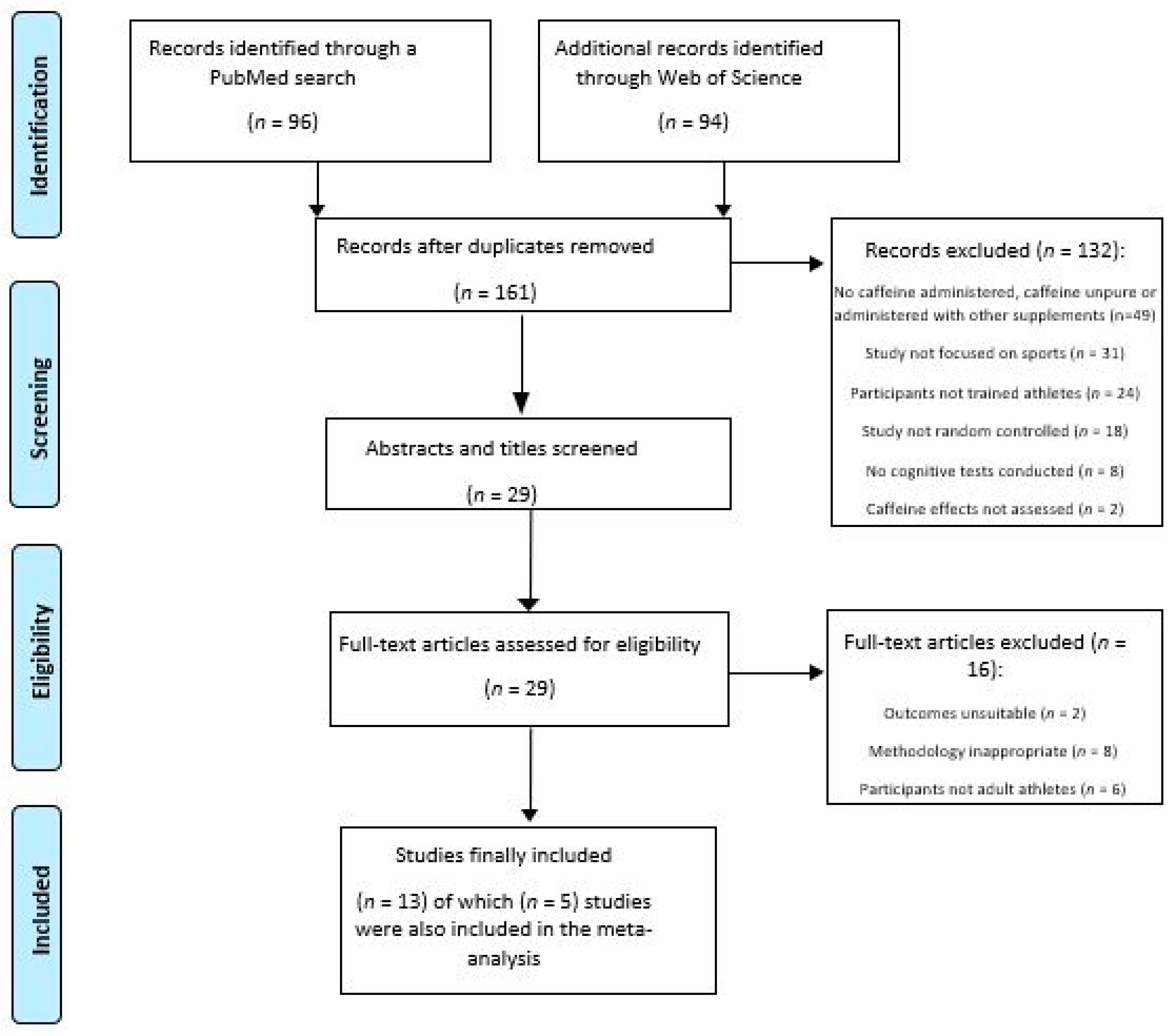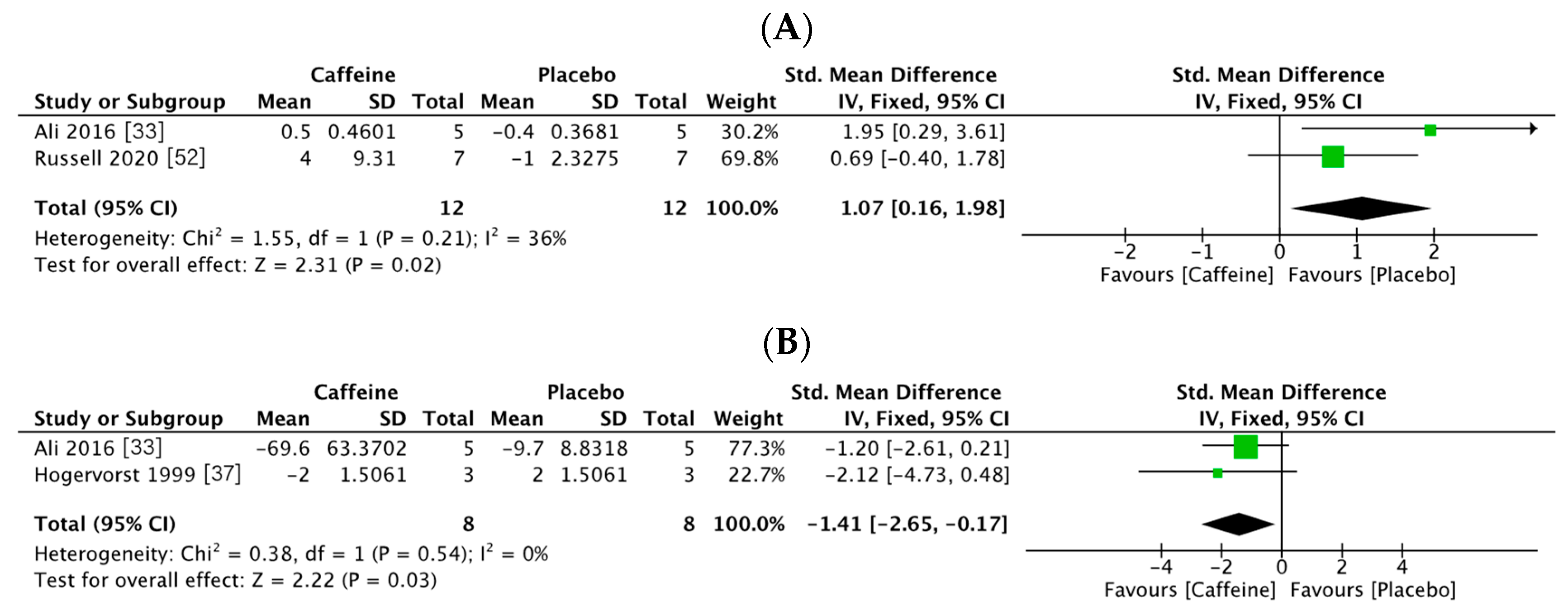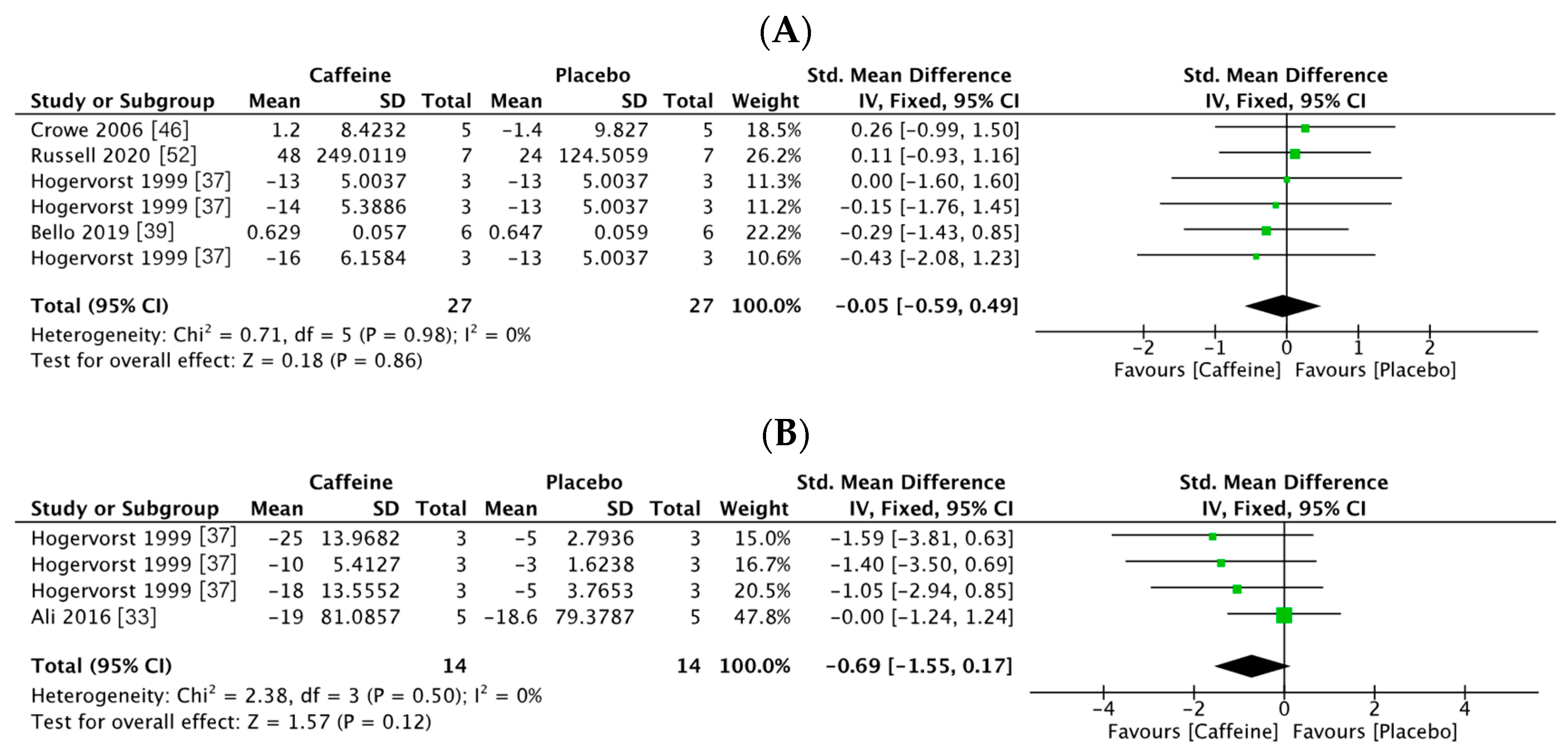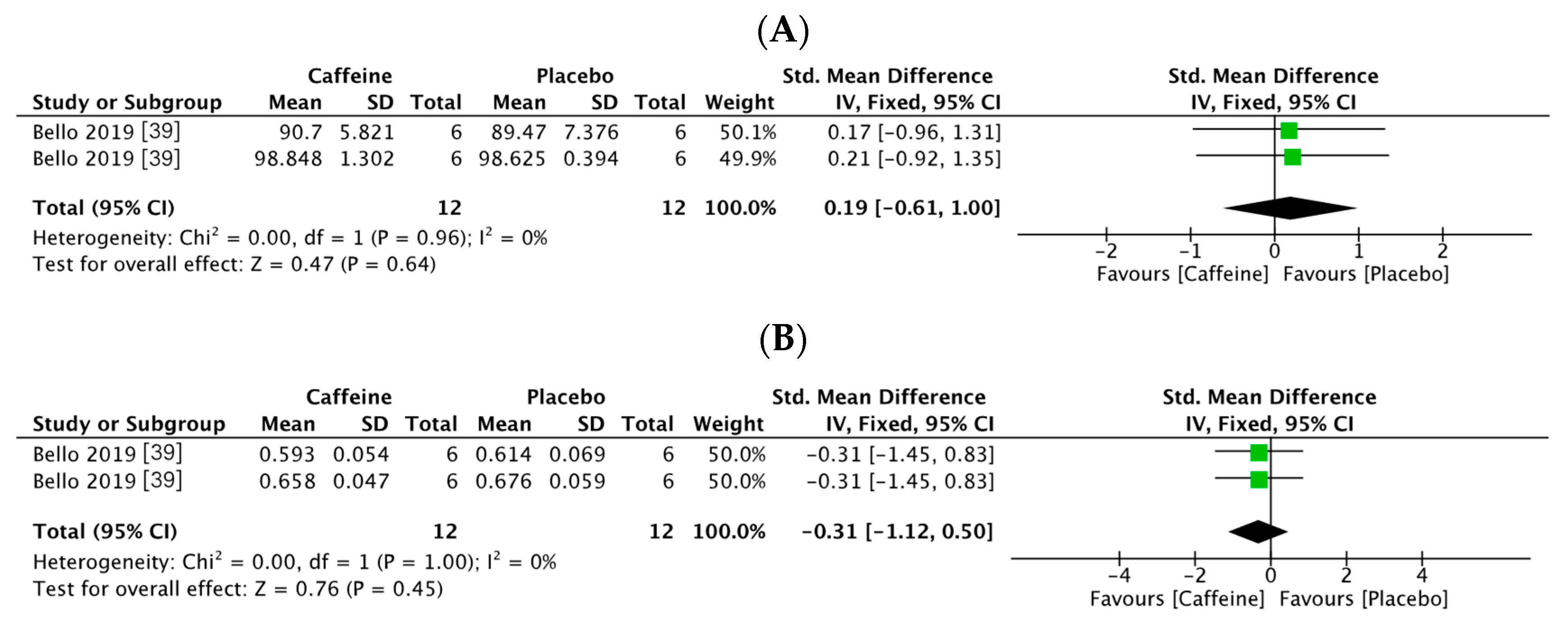Caffeine and Cognitive Functions in Sports: A Systematic Review and Meta-Analysis
Abstract
1. Introduction
2. Materials and Methods
2.1. Protocol
2.2. Search Strategy
2.3. Eligibility Criteria
2.4. Quality Assessment
2.5. Performance Outcomes
2.6. Data Synthesis and Meta-Analysis
3. Results
3.1. Selection of Studies
3.2. Quality Assessment of Studies
3.3. Caffeine Supplementation
3.4. Outcome Measures
3.5. Meta-analysis.
4. Discussion
4.1. Objective Measurements of Cognitive Performance
4.2. Self-Reported Subjective Scales
4.3. Strengths, Limitations, and Future Lines of Research
5. Conclusions
Author Contributions
Funding
Institutional Review Board Statement
Informed Consent Statement
Data Availability Statement
Conflicts of Interest
References
- Comes, A.V.; Sánchez-Oliver, A.J.; Martínez-Sanz, J.M.; Domínguez, R. Analysis of Nutritional Supplements Consumption by Squash Players. Nutrients 2018, 10, 1341. [Google Scholar] [CrossRef] [PubMed]
- Sánchez-Oliver, A.J.; Grimaldi-Puyana, M.; Domínguez, R. Evaluation and Behavior of Spanish Bodybuilders: Doping and Sports Supplements. Biomolecules 2019, 9, 122. [Google Scholar] [CrossRef] [PubMed]
- Caraballo, I.; Domínguez, R.; Guerra-Hernandez, E.J.; Sánchez-Oliver, A.J. Analysis of Sports Supplements Consumption in Young Spanish Elite Dinghy Sailors. Nutrients 2020, 12, 993. [Google Scholar] [CrossRef] [PubMed]
- Muñoz, A.; López-Samanes, Á.; Domínguez, R.; Moreno-Pérez, V.; Jesús Sánchez-Oliver, A.; Del Coso, J. Use of Sports Supplements in Competitive Handball Players: Sex and Competitive Level Differences. Nutrients 2020, 12, 3357. [Google Scholar] [CrossRef]
- Aguilar-Navarro, M.; Muñoz, G.; Salinero, J.J.; Muñoz-Guerra, J.; Fernández-Álvarez, M.; Plata, M.D.M.; Del Coso, J. Urine Caffeine Concentration in Doping Control Samples from 2004 to 2015. Nutrients 2019, 11, 286. [Google Scholar] [CrossRef]
- Costill, D.L.; Dalsky, G.P.; Fink, W.J. Effects of caffeine ingestion on metabolism and exercise performance. Med. Sci. Sports 1978, 10, 155–158. [Google Scholar] [PubMed]
- Davis, J.M.; Zhao, Z.; Stock, H.S.; Mehl, K.A.; Buggy, J.; Hand, G.A. Central nervous system effects of caffeine and adenosine on fatigue. Am. J. Physiol. Regul. Integr. Comp. Physiol. 2003, 284, 399–404. [Google Scholar] [CrossRef]
- Abo-Salem, O.M.; Hayallah, A.M.; Bilkei-Gorzo, A.; Filipek, B.; Zimmer, A.; Müller, C.E. Antinociceptive Effects of Novel A2B Adenosine Receptor Antagonists. J. Pharmacol. Exp. Ther. 2004, 308, 358–366. [Google Scholar] [CrossRef]
- Woolf, K.; Bidwell, W.K.; Carlson, A.G. The effect of caffeine as an ergogenic aid in anaerobic exercise. Int. J. Sport Nutr. Exerc. Metab. 2008, 18, 412–429. [Google Scholar] [CrossRef]
- Tarnopolsky, M.A. Effect of caffeine on the neuromuscular system--potential as an ergogenic aid. Appl. Physiol. Nutr. Metab. 2008, 33, 1284–1289. [Google Scholar] [CrossRef]
- Lara, B.; Ruiz-Vicente, D.; Areces, F.; Abián-Vicén, J.; Salinero, J.J.; Gonzalez-Millán, C.; Gallo-Salazar, C.; Del Coso, J. Acute consumption of a caffeinated energy drink enhances aspects of performance in sprint swimmers. Br. J. Nutr. 2015, 114, 908–914. [Google Scholar] [CrossRef] [PubMed]
- Cappelletti, S.; Daria, P.; Sani, G.; Aromatario, M. Caffeine: Cognitive and Physical Performance Enhancer or Psychoactive Drug? Curr. Neuropharmacol. 2014, 13, 71–88. [Google Scholar] [CrossRef] [PubMed]
- Anselme, F.; Collomp, K.; Mercier, B.; Ahmaïdi, S.; Prefaut, C. Caffeine increases maximal anaerobic power and blood lactate concentration. Eur. J. Appl. Physiol. Occup. Physiol. 1992, 65, 188–191. [Google Scholar] [CrossRef]
- Bridge, C.A.; Jones, M.A. The effect of caffeine ingestion on 8 km run performance in a field setting. J. Sports Sci. 2006, 24, 433–439. [Google Scholar] [CrossRef] [PubMed]
- Jeukendrup, A.; Gleeson, M. Sport Nutrition; Human Kinetics: Champaign, IL, USA, 2018; ISBN 1492529036. [Google Scholar]
- Mielgo-Ayuso, J.; Marques-Jiménez, D.; Refoyo, I.; Del Coso, J.; León-Guereño, P.; Calleja-González, J. Effect of Caffeine Supplementation on Sports Performance Based on Differences Between Sexes: A Systematic Review. Nutrients 2019, 11, 2313. [Google Scholar] [CrossRef] [PubMed]
- Guest, N.S.; Van Dusseldorp, T.A.; Nelson, M.T.; Grgic, J.; Schoenfeld, B.J.; Jenkins, N.D.M.; Arent, S.M.; Antonio, J.; Stout, J.R.; Trexler, E.T.; et al. International society of sports nutrition position stand: Caffeine and exercise performance. J. Int. Soc. Sports Nutr. 2021, 18, 1–37. [Google Scholar] [CrossRef]
- Southward, K.; Rutherfurd-Markwick, K.J.; Ali, A. The Effect of Acute Caffeine Ingestion on Endurance Performance: A Systematic Review and Meta-Analysis. Sports Med. 2018, 48, 1913–1928. [Google Scholar] [CrossRef]
- Grgic, J.; Diaz-Lara, F.J.; Coso, J.D.; Duncan, M.J.; Tallis, J.; Pickering, C.; Schoenfeld, B.J.; Mikulic, P. The Effects of Caffeine Ingestion on Measures of Rowing Performance: A Systematic Review and Meta-Analysis. Nutrients 2020, 12, 434. [Google Scholar] [CrossRef]
- Raya-González, J.; Rendo-Urteaga, T.; Domínguez, R.; Castillo, D.; Rodríguez-Fernández, A.; Grgic, J. Acute Effects of Caffeine Supplementation on Movement Velocity in Resistance Exercise: A Systematic Review and Meta-analysis. Sports Med. 2020, 50, 717–729. [Google Scholar] [CrossRef] [PubMed]
- Grgic, J.; Trexler, E.T.; Lazinica, B.; Pedisic, Z. Effects of caffeine intake on muscle strength and power: A systematic review and meta-analysis. J. Int. Soc. Sports Nutr. 2018, 15, 11. [Google Scholar] [CrossRef] [PubMed]
- Grgic, J. Caffeine ingestion enhances Wingate performance: A meta-analysis. Eur. J. Sport Sci. 2018, 18, 219–225. [Google Scholar] [CrossRef] [PubMed]
- Salinero, J.J.; Lara, B.; Del Coso, J. Effects of acute ingestion of caffeine on team sports performance: A systematic review and meta-analysis. Res. Sports Med. 2019, 27, 238–256. [Google Scholar] [CrossRef] [PubMed]
- López-González, L.M.; Sánchez-Oliver, A.J.; Mata, F.; Jodra, P.; Antonio, J.; Domínguez, R. Acute caffeine supplementation in combat sports: A systematic review. J. Int. Soc. Sports Nutr. 2018, 15, 60. [Google Scholar] [CrossRef]
- Vicente-Salar, N.; Santos-Sánchez, G.; Roche, E. Nutritional Ergogenic Aids in Racquet Sports: A Systematic Review. Nutrients 2020, 12, 2842. [Google Scholar] [CrossRef] [PubMed]
- Furley, P.; Wood, G. Working memory, attentional control, and expertise in sports: A review of current literature and directions for future research. J. Appl. Res. Mem. Cog. 2016, 5, 415–425. [Google Scholar] [CrossRef]
- Ribeiro, J.A.; Sebastião, A.M.; De Mendonça, A. Adenosine receptors in the nervous system: Pathophysiological implications. Prog. Neurobiol. 2002, 68, 377–392. [Google Scholar] [CrossRef]
- Ferré, S.; Fredholm, B.B.; Morelli, M.; Popoli, P.; Fuxe, K. Adenosine-dopamine receptor-receptor interactions as an integrative mechanism in the basal ganglia. Trends Neurosci. 1997, 20, 482–487. [Google Scholar] [CrossRef]
- Davis, J.K.; Green, J.M. Caffeine and anaerobic performance. Sports Med. 2009, 29, 813–832. [Google Scholar] [CrossRef]
- Berger, B.G.; Motl, R.W. Exercise and mood: A selective review and synthesis of research employing the profile of mood states. J. Appl. Sport Psychol. 2000, 12, 69–92. [Google Scholar] [CrossRef]
- Sökmen, B.; Armstrong, L.E.; Kraemer, W.J.; Casa, D.J.; Dias, J.C.; Judelson, D.A.; Maresh, C.M. Caffeine use in sports: Considerations for the athlete. J. Strength Cond. Res. 2008, 22, 978–986. [Google Scholar] [CrossRef]
- Smith, A. Effects of caffeine on human behavior. Food Chem. Toxicol. 2002, 40, 1243–1255. [Google Scholar] [CrossRef]
- Ali, A.; O’Donnell, J.; Von Hurst, P.; Foskett, A.; Holland, S.; Starck, C.; Rutherfurd-Markwick, K. Caffeine ingestion enhances perceptual responses during intermittent exercise in female team-game players. J. Sports Sci. 2016, 34, 330–341. [Google Scholar] [CrossRef]
- Stølen, T. Chamari K, Castagna C, Wisløff, U. Physiology of soccer: An update. Sports Med. 2005, 35, 501–536. [Google Scholar] [CrossRef] [PubMed]
- Pesce, C.; Tessitore, A.; Casella, R.; Pirritano, M.; Capranica, L. Focusing of visual attention at rest and during physical exercise in soccer players. J. Sports Sci. 2007, 25, 1259–1270. [Google Scholar] [CrossRef]
- Vestberg, T.; Gustafson, R.; Maurex, L.; Ingvar, M.; Petrovic, P. Executive functions predict the success of top-soccer players. PLoS ONE 2012, 7, e34731. [Google Scholar] [CrossRef] [PubMed]
- Hogervorst, E.; Riedel, W.; Kovacs, E.; Brouns, F.; Jolles, J. Caffeine Improves Cognitive Performance After Strenuous Physical Exercise. Int. J. Sports Med. 1999, 20, 354–361. [Google Scholar] [CrossRef] [PubMed][Green Version]
- Hogervorst, E.; Bandelow, S.; Schmitt, J.; Jentjens, R.; Oliveira, M.; Allgrove, J.; Carter, T.; Gleeson, M. Caffeine improves physical and cognitive performance during exhaustive exercise. Med. Sci. Sports Exerc. 2008, 40, 1841–1851. [Google Scholar] [CrossRef]
- Bello, M.L.; Walker, A.J.; McFadden, B.A.; Sanders, D.J.; Arent, S.M. The effects of TeaCrine® and caffeine on endurance and cognitive performance during a simulated match in high-level soccer players. J. Int. Soc. Sports Nutr. 2019, 16. [Google Scholar] [CrossRef]
- Shamseer, L.; Moher, D.; Clarke, M.; Ghersi, D.; Liberati, A.; Petticrew, M.; Shekelle, P.; Stewart, L.A.; Altman, D.G.; Booth, A.; et al. Preferred reporting items for systematic review and meta-analysis protocols (prisma-p) 2015: Elaboration and explanation. BMJ 2015, 249, g7647. [Google Scholar] [CrossRef]
- Brown, P.; Brunnhuber, K.; Chalkidou, K.; Chalmers, I.; Clarke, M.; Fenton, M.; Forbes, C.; Glanville, J.; Hicks, N.J.; Moody, J.; et al. How to formulate research recommendations. Br. Med. J. 2006, 333, 804–806. [Google Scholar] [CrossRef]
- Law, M.; Stewart, C.; Pollock, N.; Letts, L.; Bosch, J.; Westmorland, M. McMaster Critical Review Form-Quantitative Studies; McMaster University Occupational Therapy Evidence-Based Practice Research Group: Hamilton, ON, Canada, 1998. [Google Scholar]
- Durlak, J.A. How to Select, Calculate, and Interpret Effect Sizes. J. Ped. Psychol. 2009, 34, 917–928. [Google Scholar] [CrossRef] [PubMed]
- Cohen, J. Statistical Power Analysis for the Behavioral Sciences; Routledge: Abingdon-on-Thames, UK, 1988; ISBN 978-0-12-179060-8. [Google Scholar]
- Higgins, J.P.T. Measuring inconsistency in meta-analyses. BMJ 2003, 327, 557–560. [Google Scholar] [CrossRef]
- Crowe, M.J.; Leicht, A.S.; Spinks, W.L. Physiological and cognitive responses to caffeine during repeated, high-intensity exercise. Int. J. Sport Nutr. Exerc. Metab. 2006, 16, 528–544. [Google Scholar] [CrossRef]
- Church, D.D.; Hoffman, J.R.; LaMonica, M.B.; Riffe, J.J.; Hoffman, M.W.; Baker, K.M.; Varanoske, A.N.; Wells, A.J.; Fukuda, D.H.; Stout, J.R. The effect of an acute ingestion of Turkish coffee on reaction time and time trial performance. J. Int. Soc. Sports Nutr. 2015, 12, 37. [Google Scholar] [CrossRef] [PubMed]
- Mumford, P.W.; Tribby, A.C.; Poole, C.N.; Dalbo, V.J.; Scanlan, A.T.; Moon, J.R.; Roberts, M.D.; Young, K.C. Effect of Caffeine on Golf Performance and Fatigue during a Competitive Tournament. Med. Sci. Sports Exerc. 2016, 48, 132–138. [Google Scholar] [CrossRef]
- Pomportes, L.; Brisswalter, J.; Casini, L.; Hays, A.; Davranche, K. Cognitive Performance Enhancement Induced by Caffeine, Carbohydrate and Guarana Mouth Rinsing during Submaximal Exercise. Nutrients 2017, 9, 589. [Google Scholar] [CrossRef] [PubMed]
- Cesareo, K.R.; Mason, J.R.; Saracino, P.G.; Morrissey, M.C.; Ormsbee, M.J. The effects of a caffeine-like supplement, TeaCrine®, on muscular strength, endurance and power performance in resistance-trained men. J. Int. Soc. Sports Nutr. 2019, 16, 47. [Google Scholar] [CrossRef]
- Duncan, M.J.; Dobell, A.P.; Caygill, C.L.; Eyre, E.; Tallis, J. The effect of acute caffeine ingestion on upper body anaerobic exercise and cognitive performance. Eur. J. Sport Sci. 2019, 19, 103–111. [Google Scholar] [CrossRef]
- Russell, M.; Reynolds, N.A.; Crewther, B.T.; Cook, C.J.; Kilduff, L.P. Physiological and Performance Effects of Caffeine Gum Consumed During a Simulated Half-Time by Professional Academy Rugby Union Players. J. Strength Cond. Res. 2020, 34, 145–151. [Google Scholar] [CrossRef] [PubMed]
- Share, B.; Sanders, N.; Kemp, J. Caffeine and performance in clay target shooting. J. Sports Sci. 2009, 27, 661–666. [Google Scholar] [CrossRef] [PubMed]
- Foskett, A.; Ali, A.; Gant, N. Caffeine Enhances Cognitive Function and Skill Performance during Simulated Soccer Activity. Int. J. Sport. Nutr. Exerc. Metab. 2009, 19, 410–423. [Google Scholar] [CrossRef]
- Kenemans, J.L.; Wieleman, J.S.; Zeegers, M.; Verbaten, M.N. Caffeine and stroop interference. Pharmacol. Biochem. Behav. 1999, 63, 589–598. [Google Scholar] [CrossRef]
- Ruijter, J.; De Ruiter, M.B.; Snel, J. The effects of caffeine on visual selective attention to color: An ERP study. Psychophysiology 2000, 37, 427–439. [Google Scholar] [CrossRef] [PubMed]
- Kenemans, J.L.; Verbaten, M.N. Caffeine and visuo-spatial attention. Psychopharmacology 1998, 135, 353–360. [Google Scholar] [CrossRef]
- Wesensten, N.J.; Killgore, W.D.; Balkin, T.J. Performance and alertness effects of caffeine, dextroamphetamine, and modafinil during sleep deprivation. J. Sleep Res. 2005, 14, 255–266. [Google Scholar] [CrossRef] [PubMed]
- Kenemans, J.L.; Lorist, M.M. Caffeine and selective visual processing. Pharmacol. Biochem. Behav. 1995, 52, 461–471. [Google Scholar] [CrossRef]
- Lieberman, H.R. The effects of ginseng, ephedrine, and caffeine on cognitive performance, mood and energy. Nutr. Rev. 2001, 59, 91–102. [Google Scholar] [CrossRef] [PubMed]
- Kamimori, G.H.; Karyekar, C.S.; Otterstetter, R.; Cox, D.S.; Balkin, T.J.; Belenky, G.L.; Eddington, N.D. The rate of absorption and relative bioavailability of caffeine administered in chewing gum versus capsules to normal healthy volunteers. Int. J. Pharm. 2002, 234, 159–167. [Google Scholar] [CrossRef]
- Brunye, T.T.; Mahoney, C.R.; Lieberman, H.R.; Taylor, H.A. Caffeine modulates attention network function. Brain Cogn. 2010, 72, 181–188. [Google Scholar] [CrossRef]
- Fillmore, M.T.; Rush, C.R. Impaired inhibitory control of behavior in chronic cocaine users. Drug Alcohol. Dep. 2002, 66, 265–273. [Google Scholar] [CrossRef]
- Lorist, M.M.; Snel, J.; Kok, A.; Mulder, G. Influence of caffeine on selective attention in well-rested and fatigued subjects. Psychophysiology 1994, 31, 525–534. [Google Scholar] [CrossRef] [PubMed]
- Lorist, M.M.; Snel, J.; Kok, A.; Mulder, G. Acute effects of caffeine on selective attention and visual search processes. Psychophysiology 1996, 33, 354–361. [Google Scholar] [CrossRef] [PubMed]
- Tieges, Z.; Snel, J.; Kok, A.; Ridderinkhof, K.R. Caffeine does not modulate inhibitory control. Brain Cogn. 2009, 69, 316–327. [Google Scholar] [CrossRef] [PubMed]
- Jodra, P.; Lago-Rodríguez, A.; Sánchez-Oliver, A.J.; López-Samanes, A.; Pérez-López, A.; Veiga-Herreros, P.; San Juan, A.F.; Domínguez, R. Effects of caffeine supplementation on physical performance and mood dimensions in elite and trained-recreational athletes. J. Int. Soc. Sports Nutr. 2020, 17, 2. [Google Scholar] [CrossRef] [PubMed]




| Parameter | Inclusion Criteria |
|---|---|
| Population | Adult athletes |
| Intervention | Caffeine supplementation |
| Comparators | Placebo supplementation |
| Outcomes | Variables related to cognitive performance in sports, including reaction time, memory, focus, concentration, alertness, fatigue, motivation, and attention |
| Study design | Double-blind/single-blind and randomized cross-over design |
| Scale | Score System | Cognitive Function |
|---|---|---|
| Visual analogue scale for fatigue (VAS-F) |
|
|
| Profile of mood states (POMS) |
|
|
| Felling scale (FS) |
|
|
| Felt arousal scale (FAS) |
|
|
| Rating of perceived exertion (RPE) |
|
|
| Test | Dependent Variables | Function Measured | |
|---|---|---|---|
| Attention | SCWT (Stroop Color and Word Test) |
|
|
| Flanker test |
|
| |
| RVIP (rapid visual information processing task) |
|
| |
| Visual search test |
|
| |
| SDT (signal detection task) |
|
| |
| Reaction Time | Simple visual reaction time test |
|
|
| MCRT (motor choice reaction time test) |
|
| |
| Choice reaction time (CRT) test |
|
| |
| Inhibitory Control | Go/no-go task |
|
|
| Go/no-go and cognitive load task |
|
| |
| Simon task |
|
| |
| Memory | VVLT (Visual Verbal Learning Test) |
|
|
| Number recall test |
|
| |
| Internal Time-Keeping Mechanisms | Duration production task |
|
|
| Item | 1 | 2 | 3 | 4 | 5 | 6 | 7 | 8 | 9 | 10 | 11 | 12 | 13 | 14 | 15 | 16 | Total | MQ |
|---|---|---|---|---|---|---|---|---|---|---|---|---|---|---|---|---|---|---|
| Study | ||||||||||||||||||
| Ali et al. [33] | 1 | 1 | 1 | 1 | 1 | 1 | 1 | 1 | 1 | 1 | 0 | 1 | 1 | 0 | 1 | 1 | 14 | VG |
| Hogervorst et al. [37] | 1 | 1 | 1 | 1 | 0 | 1 | 1 | 1 | 1 | 1 | 0 | 1 | 1 | 0 | 1 | 1 | 13 | VG |
| Hogervorst et al. [38] | 1 | 1 | 1 | 1 | 1 | 1 | 1 | 1 | 1 | 1 | 1 | 1 | 1 | 0 | 1 | 1 | 15 | E |
| Bello et al. [39] | 1 | 1 | 1 | 1 | 0 | 1 | 1 | 1 | 1 | 1 | 0 | 1 | 1 | 1 | 1 | 1 | 14 | VG |
| Crowe et al. [46] | 1 | 1 | 1 | 1 | 0 | 1 | 1 | 1 | 1 | 1 | 1 | 1 | 1 | 0 | 1 | 1 | 14 | VG |
| Church et al. [47] | 1 | 1 | 1 | 1 | 0 | 1 | 1 | 1 | 1 | 1 | 1 | 1 | 1 | 0 | 1 | 1 | 14 | VG |
| Mumford et al. [48] | 1 | 1 | 1 | 1 | 0 | 1 | 1 | 1 | 1 | 1 | 1 | 1 | 1 | 0 | 1 | 1 | 14 | VG |
| Pomportes et al. [49] | 1 | 1 | 1 | 1 | 0 | 1 | 1 | 1 | 1 | 1 | 1 | 1 | 1 | 0 | 1 | 1 | 14 | VG |
| Cesareo et al. [50] | 1 | 1 | 1 | 1 | 0 | 1 | 1 | 1 | 1 | 1 | 1 | 1 | 1 | 0 | 1 | 1 | 14 | VG |
| Duncan et al. [51] | 1 | 1 | 1 | 1 | 0 | 1 | 1 | 1 | 1 | 1 | 0 | 1 | 1 | 0 | 1 | 1 | 13 | VG |
| Russell et al. [52] | 1 | 1 | 1 | 1 | 0 | 1 | 1 | 1 | 1 | 1 | 0 | 1 | 1 | 0 | 1 | 0 | 12 | G |
| Share et al. [53] | 1 | 1 | 1 | 1 | 0 | 1 | 0 | 0 | 1 | 1 | 1 | 1 | 1 | 0 | 1 | 1 | 12 | G |
| Foskett et al. [54] | 1 | 1 | 1 | 1 | 0 | 1 | 1 | 1 | 1 | 0 | 0 | 1 | 1 | 0 | 1 | 1 | 12 | G |
| Study | Population | Intervention | Outcomes Analyzed | Main Results vs. Placebo |
|---|---|---|---|---|
| Russell et al. [52] | 14 male professional academy rugby players (18 ± 1 years) | 4.1 ± 0.5 mg/kg of caffeine (gum) 15 min before and during exercise | SRT test Stroop test | SRT Congruent response accuracy Incongruent response accuracy |
| Duncan et al. [51] | 12 male subjects accustomed to regular high-intensity exercise (21.4 ± 4.4 years) | 5 mg/kg of caffeine (capsules) 60 min before start | Modified flanker task | ↓ Congruent RT ↓ Incongruent RT Congruent response accuracy Incongruent response accuracy |
| Bello et al. [39] | 12 male (21.8 ± 2.53) and 15 female (19.65 ± 3.62) professional soccer players | 275 mg (≈3.69 mg/kg) caffeine capsule 30 min before start | SRT test Go/no-go Go/no-go and COGRT wrong | ↑ SRT CRT CRT score COGRT COGRT score COGRT wrong answer |
| Pomportes et al. [49] | 16 male and six female recreational cyclists (26 ± 8) years | 67 mg/25 mL (≈0.93 mg/kg) of caffeine + 7% carbohydrate mouthwash Immediately before start and every 13 min during exercise | Duration-production task Simon task | ↓ Produced duration ↓ Variance ↑ Congruent mean RT ↓ Incongruent mean RT Error rate (%) |
| Ali et al. [33] | 10 female team game players from recreational to international (24 ± 4 years) | 6 mg/kg caffeine capsule 60 min before start | CRT test Stroop test | CRT RT CRT accuracy ‡ Stroop test RT † Stroop test accuracy |
| Church et al. [47] | 10 male recreationally active subjects (25.5 ± 1.8 years) | 3 mg/kg caffeine drink 60 min before start | Reaction time test Multiple object tracking | Upper body RT Lower body RT Multiple object tracking |
| Share et al. [53] | Seven male elite clay target shooters (28.4 ± 9.4 years) | 2 or 4 mg/kg caffeine tablets 60 min before start | Reaction time test Tracking time of target | RT TT1 TT2 |
| Hogervorst et al. [38] | 24 well-trained male subjects (23 ± 5 years) | 100 mg (≈1.36 mg/kg) of caffeine + 45 g carbohydrate energy bar Immediately before and every 55 min during exercise | Stroop Color and Word test RVIP test Visual search test Word learning Test | ↓ Stroop RT Stroop accuracy ↓ RVIP RT ↑ RVIP PT rate ↓ RVIP miss rate ↓ Visual Search RT ↑ Visual Search accuracy Delayed recall words |
| Crowe et al. [46] | 12 male and five female team sports players (21.1 ± 3.0 years) | 6 mg/kg caffeine drink 90 min before start | Simple visual reaction time test Number recall test | RT Number recall |
| Hogervorst et al. [37] | 15 male professional cyclists or triathletes (23.3 ± 3.6 years) | 8 mL/kg of 150, 225, or 320 mg/l of caffeine + 68.8 mg/l carbohydrate solution (≈1.2, 1.8, or 2.56 mg/kg of caffeine) 60 min before start 3 mL/kg of 150, 225, or 320 mg/l of caffeine + 68.8 mg/l carbohydrate solution (≈0.45, 0.675, or 0.96 mg/kg of caffeine) every 20 min during exercise | Stroop Color and Word Test SDT test Motor choice reaction time test VVLT | ↑ Stroop speed ↑ SDT efficiency ↑ SDT speed ↑ Simple psychomotor speed ↑ Complex psychomotor speed ↑ S-R incompatible choice speed VVLT delayed number recall ↑ VVLT speed |
| Study | Population | Intervention | Outcomes Analyzed | Main Conclusion |
|---|---|---|---|---|
| Duncan et al. [51] | 12 male subjects accustomed to regular high-intensity exercise (21.4 ± 4.4 years) | 5 mg/kg of caffeine (capsules) 60 min before start | RPE VAS | ↓ RPE RTIPE RTIME |
| Cesareo et al. [50] | 12 male resistance-trained subjects (23.2 ± 3.1) | 300 mg (≈3.6 mg/kg) caffeine capsule 90 min before start | VAS-F | ↑ Energy ↑ Focus ↑ Motivation to exercise Fatigue |
| Ali et al. [33] | 10 female team game players from recreational to international (24 ± 4 years) | 6 mg/kg caffeine capsule 60 min before start | FS FAS POMS | ↑ Rating of pleasure ↑ Rating of arousal ↑ Rating of vigor ‡ Rating of fatigue |
| Mumford et al. [48] | 12 male recreational golfers (34.8 ± 13.9 years) | 155 mg (≈1.9 mg/kg) caffeine drink 25~35 min before start and 120 min during exercise | VAS-F | Alertness Overall confidence Concentration ↑ Energy ↑ Fatigue |
| Church et al. [47] | 10 male recreationally active subjects (25.5 ± 1.8 years) | 3 mg/kg caffeine drink 60 min before start | VAS-F | ↑ Energy Alertness Focus |
| Foskett et al. [54] | 12 male professional soccer players (23.8 ± 4.5 years) | 6 mg/kg caffeine capsules 60 min before start | RPE | RPE |
Publisher’s Note: MDPI stays neutral with regard to jurisdictional claims in published maps and institutional affiliations. |
© 2021 by the authors. Licensee MDPI, Basel, Switzerland. This article is an open access article distributed under the terms and conditions of the Creative Commons Attribution (CC BY) license (http://creativecommons.org/licenses/by/4.0/).
Share and Cite
Lorenzo Calvo, J.; Fei, X.; Domínguez, R.; Pareja-Galeano, H. Caffeine and Cognitive Functions in Sports: A Systematic Review and Meta-Analysis. Nutrients 2021, 13, 868. https://doi.org/10.3390/nu13030868
Lorenzo Calvo J, Fei X, Domínguez R, Pareja-Galeano H. Caffeine and Cognitive Functions in Sports: A Systematic Review and Meta-Analysis. Nutrients. 2021; 13(3):868. https://doi.org/10.3390/nu13030868
Chicago/Turabian StyleLorenzo Calvo, Jorge, Xueyin Fei, Raúl Domínguez, and Helios Pareja-Galeano. 2021. "Caffeine and Cognitive Functions in Sports: A Systematic Review and Meta-Analysis" Nutrients 13, no. 3: 868. https://doi.org/10.3390/nu13030868
APA StyleLorenzo Calvo, J., Fei, X., Domínguez, R., & Pareja-Galeano, H. (2021). Caffeine and Cognitive Functions in Sports: A Systematic Review and Meta-Analysis. Nutrients, 13(3), 868. https://doi.org/10.3390/nu13030868








